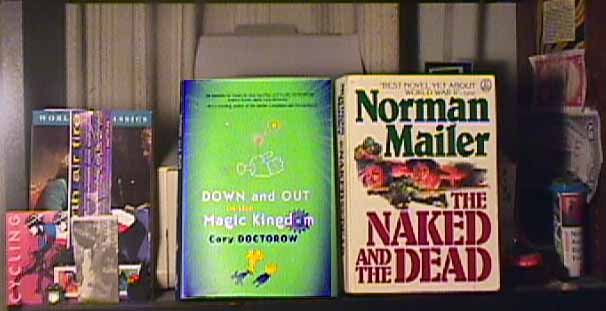
I was listening to KPFA one time, several years ago, and Larry Bensky was giving a commentary. He said something like "The most mind boggling thing about the capitol is how clean it looks up close, and how corrupt it looks on paper." I've thought a lot about that comment since, because it illustrates so well how disconnects creep into our system when we use too few kinds of checks and balances. I call this phenomenon "the creeping crud."
When I was a teenager I read a sci-fi book called The Mind Behind The Eye, by Joseph Green. It was about a time when the solar system was attacked by 300 foot tall humanoid aliens. The humans manage to capture one, who is brain damaged in the struggle. They carve out his brain and put a cockpit in his skull, and then send the smartest guy on earth to find out why the invasion was happening. It turns out that the aliens had almost killed their home, and they needed a new world to exploit just to survive themselves.
Worlds within worlds. I thought about that idea when I read about how Nike was moving their factories from Taiwan to China to Vietnam just to keep their labor costs down, just so they could "remain competitive." Watching the beltway commentators talk about the "need to expand trade" really drove home the point. The reason it looks so clean up close is that all of the insiders have the same general understanding of the role of money in transactions. They didn't realize that they were the 300 foot aliens who were always needing a new world to exploit. Washington had figured out how to keep the victims out of sight and out of mind at least a hundred years ago, and nothing can be done to change that quickly.
When a band named No Doubt had a hit with a song that contained the lyric "we need to stop pretending who we are" I found something wise in the chorus of money that flowed into their pockets. People were saying "you're saying what needs to be said, so well I want to join your campaign." It seemed to me that the politics of transformation involve a new understanding of the role of the marketplace. A recent article in Newsweek about the role of Taiwanese Rock Stars in Chinese politics indicated to me that I am not the only one that sees things this way.
Tian Harter
Postscript (March 14th, 2003): I first put this page on my website more than two years ago. Since then, the concept of a heads up display has been explored a bit by other authors. Here are a couple that come to mind:
In Cory Doctorow's book, Down and Out in the Magic Kingdom, a Heads Up Display (HUD) is part of the furniture of their lives for many of the characters in the book. About half way through the story, the main character's HUD goes out on him, which works out to something like losing a computer or desktop status feedback panel. It was about the opposite of what happens in The Mind Behind The Eye, where the host gives out on the pilot, so to speak.
Norman Mailer's book doesn't have any kind of a similar plot thread. The reason I put that up here was that not long before I took this picture, I heard an interview with Mailer on KQED's Forum show. He was talking about his most recent book, a writer's manual. People were calling with all sorts of questions for the great author. One person asked Mailer how he "amplified his inner voice as a writer?" Mailer couldn't hear the question, so he had the guy repeat it. He still couldn't hear the question, so he had to put his amplifying ear plugs back in. A theme of his comments that day seemed to me to boil down to blurring the line between the inner and outer voices, a fair enough way to go.